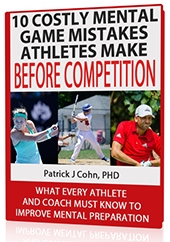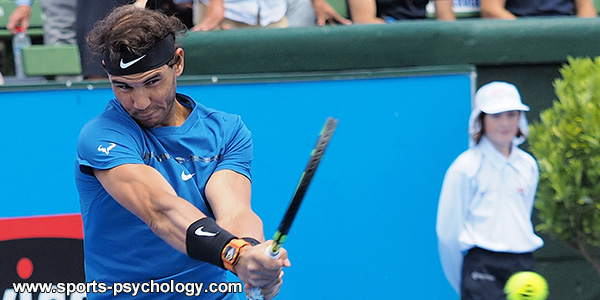How Excuses Hurt Your Mindset in Sports
Summary: Excuses undermine an athlete’s performance by shifting responsibility to outside factors. Successful athletes take full control, focus on adjustments, and approach challenges as problems to solve. Visualization and reflection on past competitions help reinforce a mindset of responsibility.
Excuses, excuses, excuses…
Excuses are the enemy of any athlete.
Excuses shrug off responsibility and place the blame for a lackluster performance on something (weather, bad competition site, faulty equipment) or someone else (teammate, bad official, unruly fans).
Take for Example the Following Excuses, Some of which may Strike a Chord with you:
- “I was stuck in traffic and I didn’t get a chance to warm up.”
- “My goggles leaked.”
- “My ankle hurt midway through the competition.”
- “That umpire was horrible.”
- “I have a cold.”
- “I didn’t get much sleep last night.”
- “The field conditions were bad.”
Some athletes come to a competition with an excuse in hand and some athletes make excuses in the middle of a competition.
Both situations take the responsibility out of your hands and onto other variables…
Ultimately, excuses take control right from under your feet and give control to some force outside of yourself, leaving you a nervous wreck.
No athlete, in any sport, will perform well when they allow tough circumstances to dictate their actions in competition.
It’s been said that those that make excuses, seldom make anything else.
For this reason, you need a different approach when negative circumstances occur.
Excuses would have been easy for Rafael Nadal to make at the 2018 US Open.
Nadal was shut out in the first set 0-6 against Dominic Thiem.
These circumstances were relatively uncharted waters…
Nadal had only been shut out in the first set just the three times in nearly seven years.
Nadal battled forward through the longest match of his US Open career (four hours and 49 minutes), in overwhelming humidity and snatched the victory 0-6 6-4 7-5 6-7 (4-7) 7-6 (7-5).
The key for Nadal was to make a conscious choice to make adjustments rather than look for excuses.
NADAL: “I am the guy to look at myself. I needed to move forward, to change that dynamic, and I did. But the first step to change that dynamic is not to find an excuse on the racket or on the string or on something that is not the truth. The only truth is that you have to do things better to be able to fight for the point and fight for the match.”
Nadal knew if he was to turn things around, he would need to focus on making adjustments to his tactics and fight for every point, one by one.
You always have a choice: You can embrace excuses or you can fight for your potential.
So which will you fight for?
How to Overcome the Excuse Trap
Review past performances where you didn’t do as well as you wanted or those competitions where you gave less than best after some undesirable circumstances.
What were some of the excuses in your mind that held you back or made you give up?
How can you take full responsibility for your performance and take back control of the situation?
Mentally, put yourself back under those circumstances and visualize yourself responding as if you’re in control, not outside factors.
Choose to be problem solver rather than an excuse finder.
Taking Control
1. Take Full Responsibility for Your Performance
Excuses shift control away from you. Own your actions and focus on what you can do in the moment to improve your performance.
2. Adjust Instead of Excusing
When conditions are tough, make adjustments rather than blaming outside factors. Small changes in tactics or mindset can help you stay competitive.
3. Visualize Yourself in Control
Mentally revisit past competitions where excuses held you back. Picture yourself responding with focus and control instead of blaming circumstances.
4. Become a Problem Solver
Approach challenges with solutions. Athletes who look for ways to adapt and fight for every point develop resilience and perform at a higher level.
Related Sports Psychology Articles:
- Improve Mental Toughness For Volleyball
- How to Improve Your Golf Mental Preparation
- Mental Preparation to Improve Focus in Big Games
Free Mental Toughness Reports

Get instant access to a mental game report to improve your mental toughness. Are you making one or more of these “deadly” mental game mistakes prior to competition? You can improve your mental game with one of our free sports-specific reports below.
with our free mental toughness reports, you’ll:
- Discover if you have positive or negative pregame jitters.
- Identify your pre-competition mental game mistakes.
- Learn the important pregame mental skills to boost your performance and success!
Learn how mental game strategies can boost your mental toughness in sports with Dr. Cohn’s free mental game reports!
FAQ: Overcoming Excuses in Sports
Q: Why are excuses harmful to athletes?
A: Excuses shift responsibility away from you and give control to outside factors. This reduces focus, increases nerves, and lowers performance.
Q: How can athletes take responsibility for their performance?
A: Athletes should focus on what they can control, own their actions, and make conscious adjustments instead of blaming conditions or others.
Q: What role does visualization play in overcoming excuses?
A: Visualization helps you mentally rehearse responding with control during tough situations. It trains your mind to focus on solutions instead of problems.
Q: How can athletes respond to tough conditions without making excuses?
A: Adjust tactics, stay focused on each point, and approach challenges as problems to solve. This mindset improves resilience and performance.
Q: Can reviewing past performances help reduce excuses?
A: Yes, analyzing past situations where excuses arose helps you identify patterns and prepare strategies to take control in future competitions.
FAQ: Returning from Athletic Injury
Q: What emotions do athletes face when returning from injury?
A: Athletes may experience fear, anxiety, impatience, pressure, and excitement. These emotions can affect focus, muscle tension, and overall performance.
Q: How can athletes manage fear of re-injury?
A: Focus on the process of playing, stick to your pregame routine, and gradually rebuild confidence through practice and small goals.
Q: Why is a pregame routine important after an injury?
A: A familiar routine helps normalize competition, reduce stress, and allow the athlete to focus on performance rather than potential setbacks.
Q: How should athletes approach returning to peak performance?
A: Take each practice and game step by step. Do not expect immediate peak performance, and build confidence gradually.
Q: Can positive emotions affect a comeback?
A: Yes, excitement and happiness can sometimes lead to overconfidence or distraction. Managing all emotions is key to a controlled and successful return.
Dr. Patrick Cohn is an expert mental performance coach who has helped athletes for over 30 years enhance their performance. Dr. Cohn earned a master’s degree in sports psychology from CSUF and a Ph.D. from the University of Virginia, specializing in Applied Sports Psychology.

